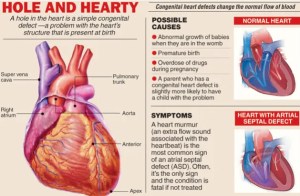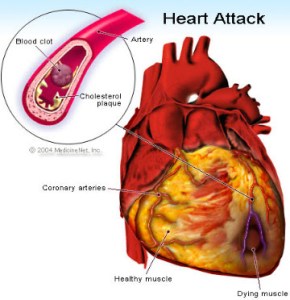Heart diseases are one of the most dreaded health issues of our time, accounting for more than 17.3 million deaths worldwide annually. Also, many people seek treatment each year for heart ailments. While the world is witnessing a sustained increase in the number of heart patients, there is also a need for creating awareness among the public about the common conditions of heart diseases and the possible precautions to be taken to ensure that their lives are at a lesser risk. Remember that an early diagnosis and treatment of heart ailments can make your life safe.
While many are aware of the coronary heart diseases (the most common type of heart disease caused by a blockage of arteries due to the settlement of excessive cholesterol or fat), there is a lack of awareness about the other types of heart diseases which can be equally fatal. Here’s a probe into the some of the different such conditions that can lead to a heart ailment.

Rheumatic Heart Diseases
Rheumatic fever, caused by streptococcal bacteria, and normally affecting children between the ages 5-15, may cause weakening of the heart muscles or damage the heart valves that can lead to a case of rheumatic heart disease if proper treatment is not provided.

The symptoms of rheumatic fever may include a sore throat, difficulty in swallowing, high temperature, nausea or vomiting. Consult your doctor on the onset of such symptoms for the necessary medical care.
Inflammatory Heart Diseases
These types of heart diseases are caused by the inflammation of the heart muscle or the membrane sac (an envelope that covers the heart). The inflammation may be due to an infection, toxic agents and maybe even due to an unknown cause.
Disorders such as Cardiomyopathy, Pericardial Disease, and Valvular Diseases come under the category of inflammatory heart diseases.
Cardiomyopathy is caused due to the problems in heart muscles, often with reasons being genetic. This can lead to the enlargement of the heart.
Fluid accumulations, inflammation in the pericardium or the membrane sac which covers the heart causes Pericardial Heart Diseases.
Damages, leaks or prolapse in the valves leads to Valvular heart diseases and like Cardiomyopathy, the causes may be genetic.

The symptoms of inflammatory heart ailments may include chest pain and shortness of breath, edema, swelling of feet or ankle and fatigue. Consult your doctor for an investigation and the necessary treatment can include the use of antibiotics and other medication for controlling the inflammation.
Hypertensive Heart Disease
As the name suggests hypertensive heart diseases are caused by hypertension (very high blood pressure). The uncontrolled increase in the blood pressure may eventually lead to substantial stress in the blood vessels causing them to rupture. This can lead to fatal conditions like stroke or heart failure.
While the symptoms of hypertensive heart diseases may vary with the severity of the condition, they can include chest pain and shortness of breath, swelling of feet, or fatigue. Consult your doctor for an investigation and the necessary treatment can include medication to prevent clotting and improving the blood flow to the heart. Surgical intervention may be recommended in extreme cases.
Ischemic Heart Diseases
Ischemic heart diseases, also known as coronary artery diseases are usually caused by a narrowing of blood vessels leading to a reduced blood flow to the heart. The major risk factors include smoking, diabetes mellitus, high cholesterol levels, hypertension, stress or genetic and hereditary factors. Conditions for ischemic heart diseases can include the following:
Angina:
Angina is caused by a lack of oxygen supply to the heart causing sharp pain and shortness of breath to the patient among other symptoms. While angina is different from a heart attack that causes a permanent damage, it is important that you consult your doctor immediately if you feel the discomfort. Based on the investigations that may include an angiogram, your doctor will recommend a course of medication or other surgical procedures such as angioplasty for more severe cases.
Heart Attack:
A heart attack also knows as Myocardial Infraction occurs when the blood flow to the heart is stopped. The symptoms are severe chest pain radiating to the shoulder and jaw, shortness of breath and a high amount of sweating. A heart attack has the potential to cause permanent heart damage and demands immediate medical attention. Heart attacks do not always lead to death but have to be very seriously dealt with as a medical emergency care and proper treatment has to be sought immediately.
Heart Failure
When the heart becomes too weak or damaged to pump blood (as in an elderly person), it causes a shortage of blood flow to various organs in the body. In this condition, the heart still functions but rather inefficiently preventing vital organs from receiving an adequate amount of blood and normal functioning. Comprehensive medical attention is a must in such cases.
While the mere mention of the term Heart Attack may be a scary feeling for a person, it is important to learn the early warning signs to recognize a heart attack and sooner you get the treatment, the better. Remember that time is of an essence in treating heart ailments.
Visit the Cardiac Centre of EMC for the best treatment for heart diseases in Cochin that provides 24×7 interventional Cardiology services that include primary angioplasty and a full-fledged Coronary Care Unit with 1:1 patient-nurse care in acute cases of heart attack.

For more information Visit Our Clinic Now
We prove full treatment of a patient suffering from any Cardio Related Problems.
Visit Our Website Today:-www.drgyanhomoeo.com
Book Your Appoint Now:-https://www.drgyanhomoeo.com/book-an-appointment/




